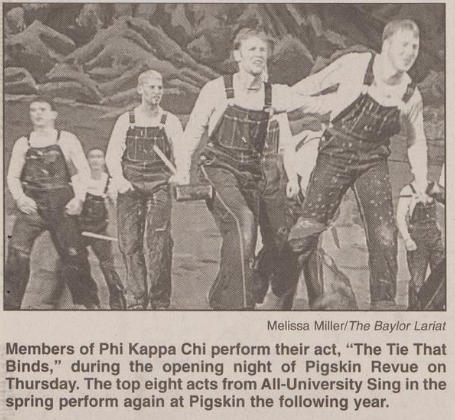By Marisa Young | Staff Writer
Upon its founding, Baylor banned the chartering of national fraternities and sororities. It wasn’t until 1975 that the ban was finally lifted, the floodgates opened and Baylor Greek life’s tumultuous and iconic history began.
Before the university allowed nationally-affiliated Greek life, several local men’s and women’s groups formed to promote specific values and earned Greek letters. Some of these still exist today, such as Phi Kappa Chi, Kappa Chi Alpha and Kappa Omega Tau.
Multicultural groups also sprang up before the ban on Greek life was lifted; the first to join campus was the historically African-American sorority Zeta Phi Beta in 1972. Today, seven out of the nine “Divine Nine” sororities and fraternities call Baylor home.

The first International Fraternity Council fraternity to join Baylor developed from the pre-existing Sigma Omega Sigma, a local men’s group. This group became the Tau Kappa Epsilon chapter and was nationally affiliated in 1975. Kappa Alpha Theta was the first National Panhellenic Council sorority to charter on campus in 1976, formed from the local women’s group Delta Alpha Pi.
Other organizations followed these trailblazers to Baylor’s campus, and Greek life quickly established itself as a central vein in Baylor’s culture and student body.
During the ’80s and ’90s, Greek participation in All-University Sing and the homecoming parade steadily rose. The ’90s were referred to as the “decade of the dynasties,” as Phi Gamma Delta, Phi Kappa Chi and Kappa Omega Tau traded off the top three places from 1993-1996. This competitive spirit surrounding Sing continues today, and Baylor’s Greek life has continued to build the university’s iconic sphere of homecoming festivities.
The Lariat has documented Sing and Pigskin since their humble beginnings, providing their own columns on each group’s performance every year.
A Lariat copy from 1954 previewed the third All-University Sing. It stated that “cash prizes of $50, $15 and $10 and three loving cups will be presented to the groups providing the best entertainment of the evening.” Coverage intensified as Greek life participation increased, and students still look to The Lariat during Sing season today for its insight and critiques.
Alumni who attend homecoming have the opportunity to reflect on how their organizations have developed since their own time at Baylor.
Class of 2025 Alpha Chi Omega alumna Katie Kuiken returned for homecoming and felt grateful to watch her chapter “spreading sisterhood” during the festivities.
“It’s super fulfilling to come back as an alumna and see Alpha Chi in Pigskin,” Kuiken said.
Class of 1999 Tau Kappa Epsilon alumnus Lee Auvenshine is a “regular attendee” of homecoming, and said he has enjoyed seeing the fraternity’s growth over the years since he graduated.
“It was a joy seeing TKE’s float this year,” Auvenshine said. “Float was a big deal when I was a student … In 1997, our theme was ‘Bevo: It’s what’s for dinner.’ We were playing the University of Texas, and we had a steer roasting on a fire pit on the float.”
Participation in Greek life allowed Auvenshine to form authentic, lasting connections. He said he and some of his fellow TKE members now have family members of their own at Baylor, and they get to see them experience the “same joys” that made up his college experience.
“My hope is that our guys continue to look for those real friendships that transcend their college days into their adulthood,” Auvenshine said.
Over the years, the university has seen some Greek organizations come and go. The sorority Kappa Delta, whose letters are still on Stacy Riddle, was closed by the chapter’s headquarters in 2010 due to a lack of membership.
Other groups have been temporarily banned from campus and later returned, typically for violating university policy. Perhaps the most prominent instance happened in 2010, when the fraternity Sigma Chi lost their charter due to a student death that occurred at one of its off-campus events.
Navarro student, 19-year-old Megan Helal, died in a Waco hospital after binge-drinking at Myner’s bar, which hosted a Sigma Chi party. The autopsy concluded that Helal passed due to a non-drinking-related arrhythmia, though the family still attempted to sue both the bar and Sigma Chi Corp.
The court ruled that the fraternity was not responsible for Helal’s death. Following this ruling, Sigma Chi was reinstated on Baylor’s campus in 2015 and participates fully in Baylor student activities today.
The most recent Greek development was the chartering of NPC sorority Alpha Phi in 2019. With this addition, Baylor is now home to nine NPC sororities and eight IFC fraternities.